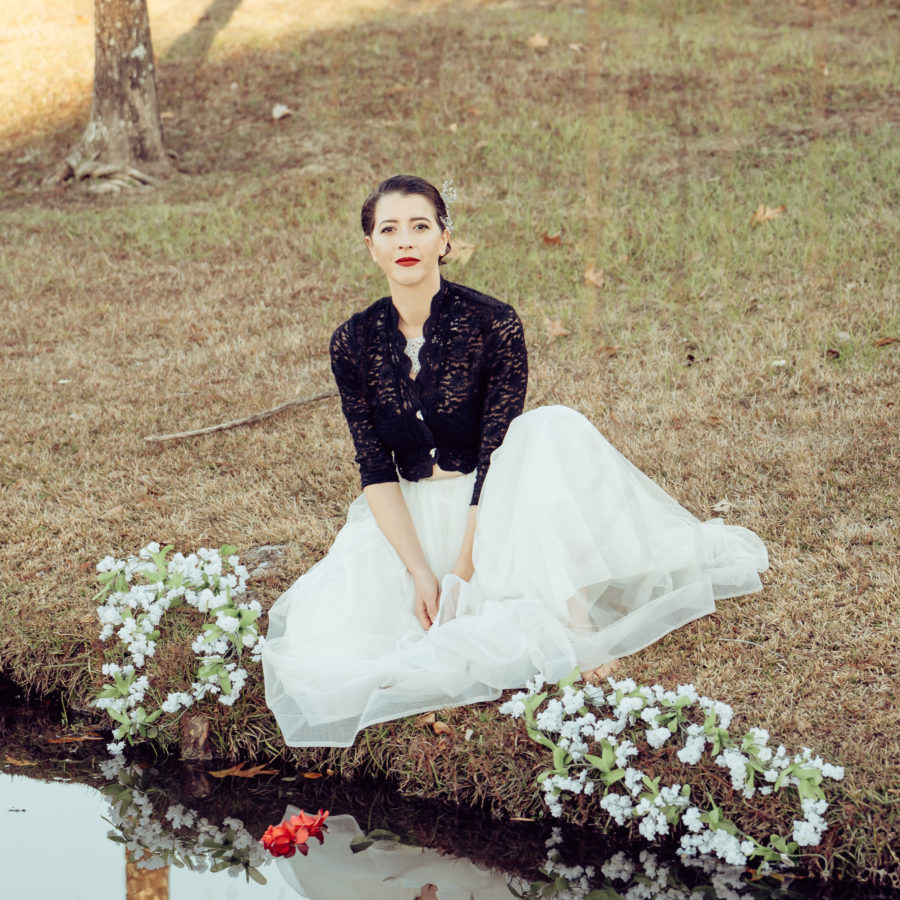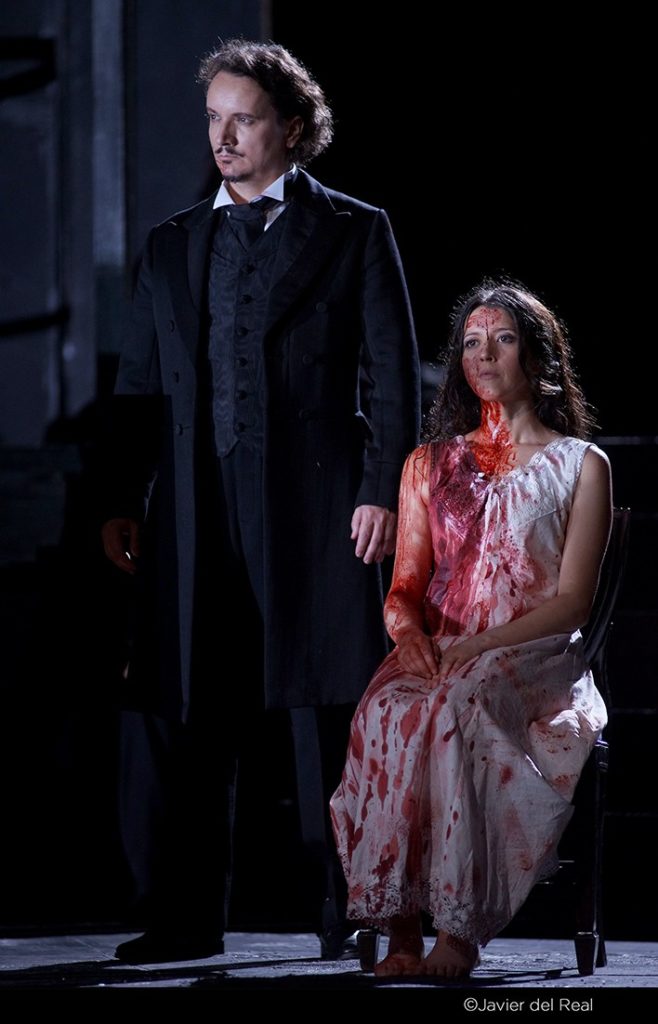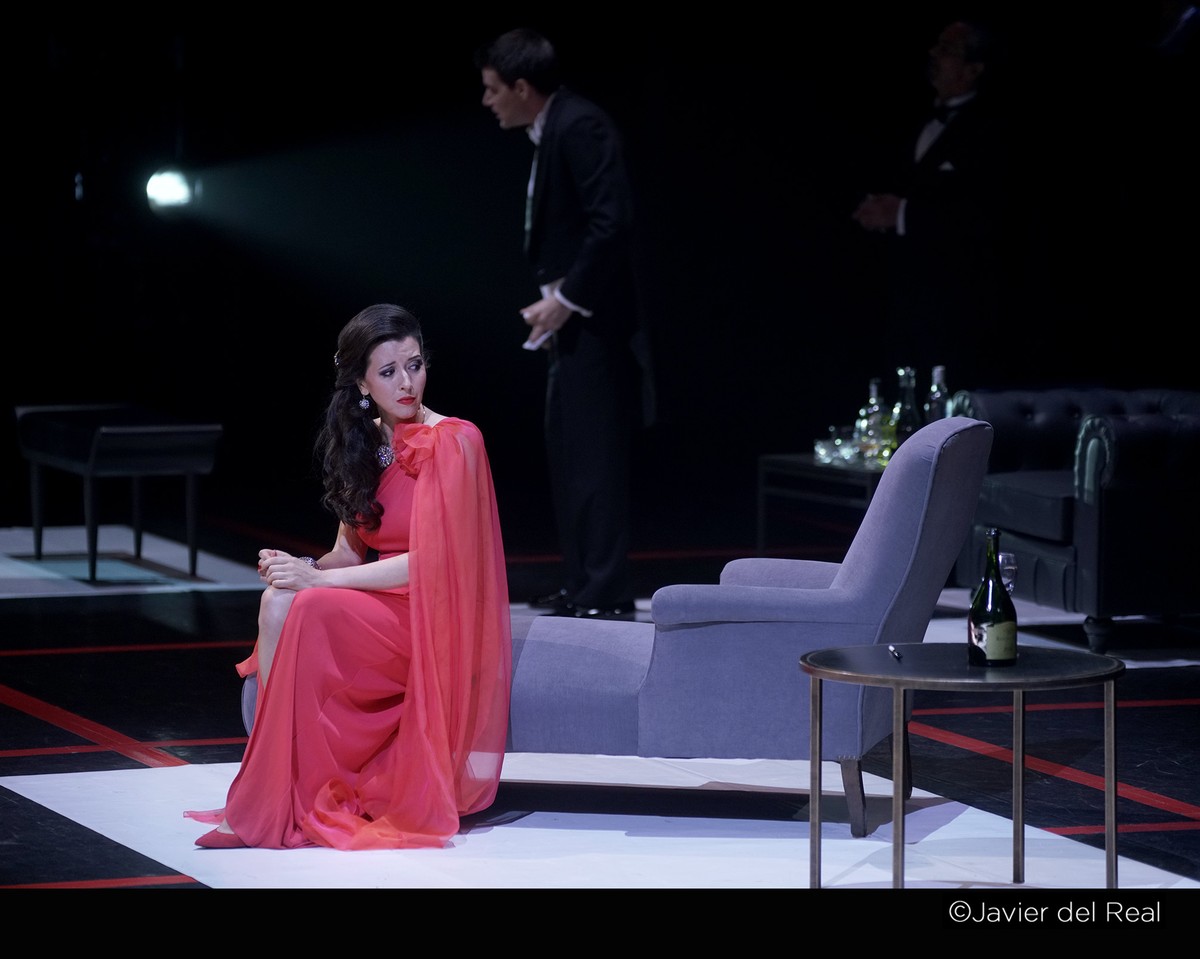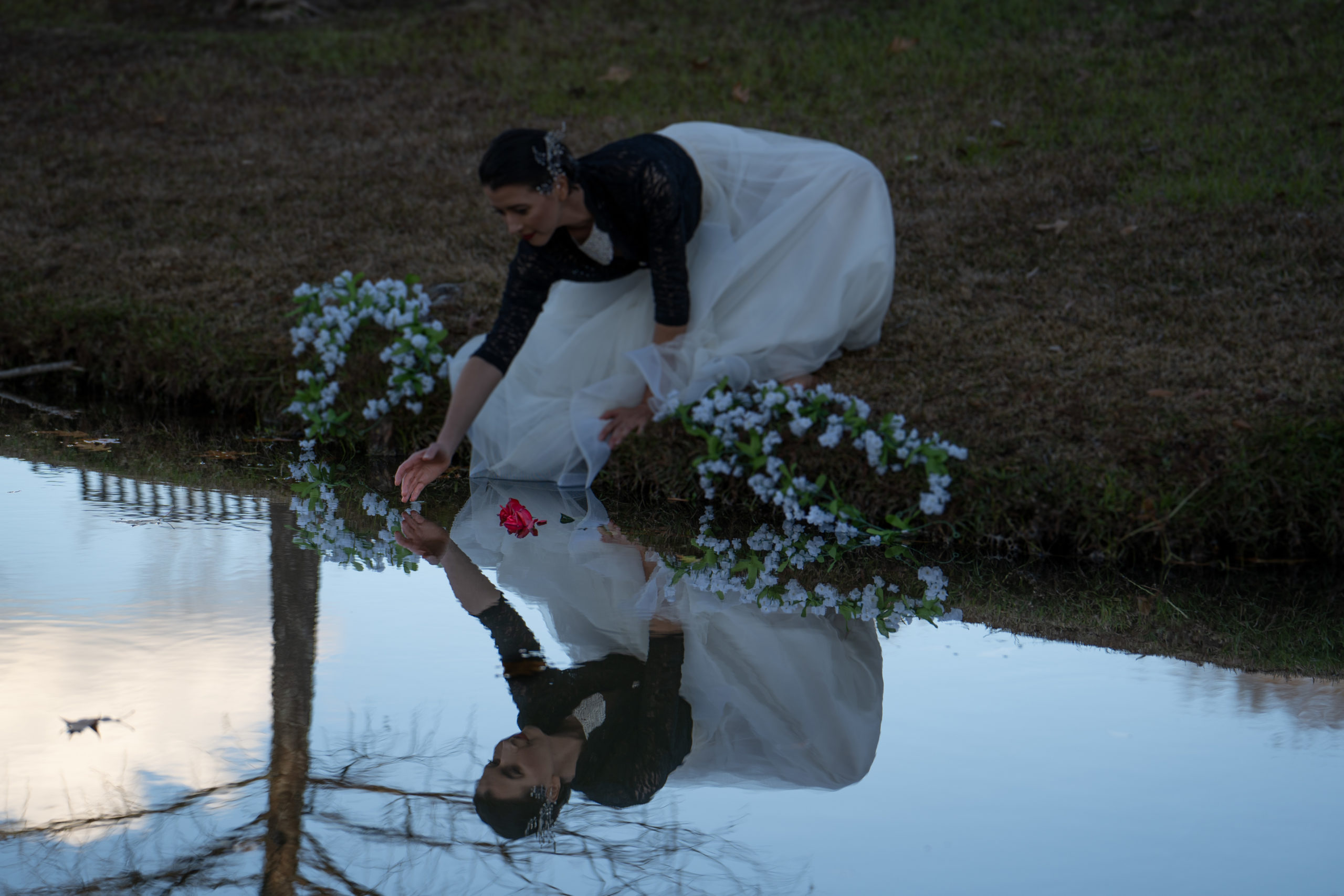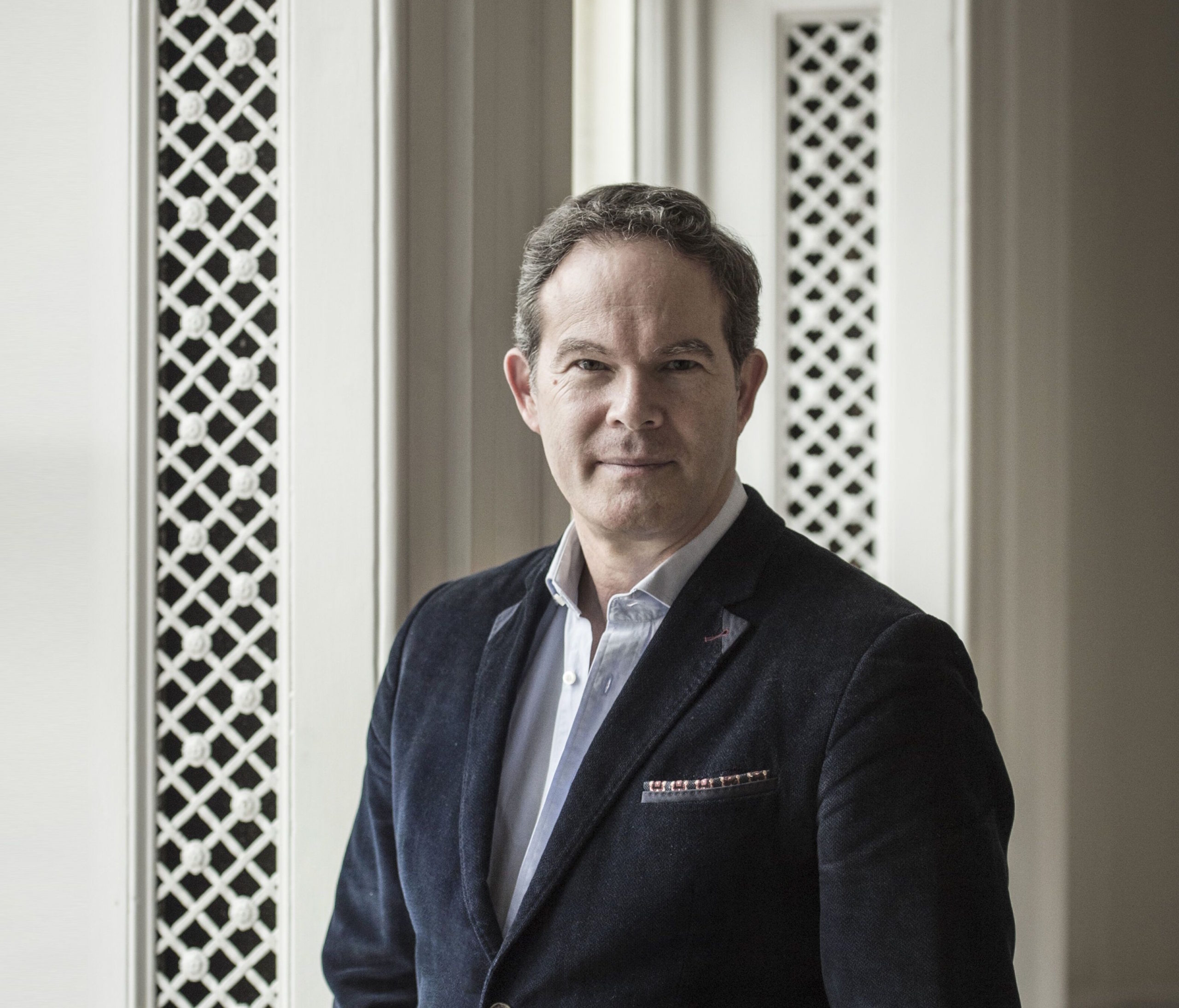
Photo: IMG Artists
Years ago I had the pleasure of speaking with Gerald Finley for the first time. It was a conversation about three major role debuts he was making within the space of a year, ones which included the lead in Aribert Reimann’s King Lear at the 2017 edition of the Salzburg Festival (a process he characterized at the time as “emotionally wringing”). The interview marked the first cover story of my writing career, and the first of many subsequent conversations, on and off the record, about various aspects of theatre, music, performance style, and of course, singing.
Starting out as a chorister in Ottawa, the bass baritone went on to study at the Royal College of Music before being accepted into the prestigious UK-based National Opera Studio. Finley’s career marked by a talent for blending sharp music insights, studious vocal practise, and instinctual theatricality. With every role (be they in the operas of Mozart and Puccini or those of Adams and Turnage) Finley’s multi-hued artistry expands, his voracious creative curiosity reaching new and fascinating corners. Noted for his portrayal of Don Giovanni, Finley has performed the role in New York, London, Paris, Rome, Vienna, Prague, Tel Aviv, Budapest, and at the Glyndebourne Festival, opposite Luca Pisaroni as Leporello.

Gerald Finley as Iago (opposite Jonas Kaufmann) in the Bayerische Staatsoper production of Otello, 2018. Photo: W. Hösl
Finley has performed in many prestigious houses, with Bayerische Staatsoper, Staatsoper Unter den Linden Berlin, Wiener Staatsoper, and the famed Salzburg Festival among them. The focus on German-speaking organizations is particularly noteworthy in light of our most recent conversation; as you’ll read, Finley wasn’t always so confident in such locales, vocally or otherwise, and it took him what he admits was a long time to mature vocally. As he told Bachtrack‘s Mark Pullinger in November 2019,
At one point I had Mozart, Handel and Britten on my CV – there was nothing in between, nothing lyrical, nothing Italianate – and that’s a real struggle when you’re trying to audition. I set myself some hard targets, like Hans Sachs, and I had to learn how to release the sound. Hopefully things are maturing and I’m getting better and keeping the voice fresh.
That freshness has revealed itself in some wonderfully memorable performances over the years. He did, in fact, get to Hans Sachs in Die Meistersinger von Nürnberg (more than once), as well as Amfortas in Parsifal; other noted roles include the villainous Scarpia in Puccini’s Tosca, the tormented Athanaël in Massenet’s Thaïs and the very black Bluebeard in Bartók’s Bluebeard’s Castle. Finley is also an enthusiastic supporter of contemporary composers, singing in several world premieres, including Tobias Picker’s Fantastic Mr. Fox in 1998, Mark-Anthony Turnage’s The Silver Tassie in 2000, and the song cycle True Fire by Kaija Saariaho (who dedicated the work to him), under the baton of Gustavo Dudamel in 2015.
Finley made a comically memorable turn as Verdi’s Falstaff (complete with a costume that made him seem four times his size) with the Canadian Opera Company in 2014, and a scarily sociopathic Iago in Othello (opposite tenor Russell Thomas) as part of the COC’s 2018-2019 season. The Royal Opera House Covent Garden recently marked his 30th anniversary with the company,which coincided with his performance in the ROH production of Brittten’s Death in Venice; classical writer Alexandra Coghlan praised Finley’s “sketching character after character in deft musical lines.” Along with working with celebrated conductors (including Mariss Jansons, Sir Antonio Pappano, Kiril Petrenko, Sir Simon Rattle, Colin Davis, Vladimir Jurowski, Fabio Luisi, Franz Welser-Möst, Harry Bicket, and Bernard Haitink), Finley was made an Officer of the Order of Canada in 2014; three years later, he was appointed Commander of the Order of the British Empire (CBE) for services to opera.
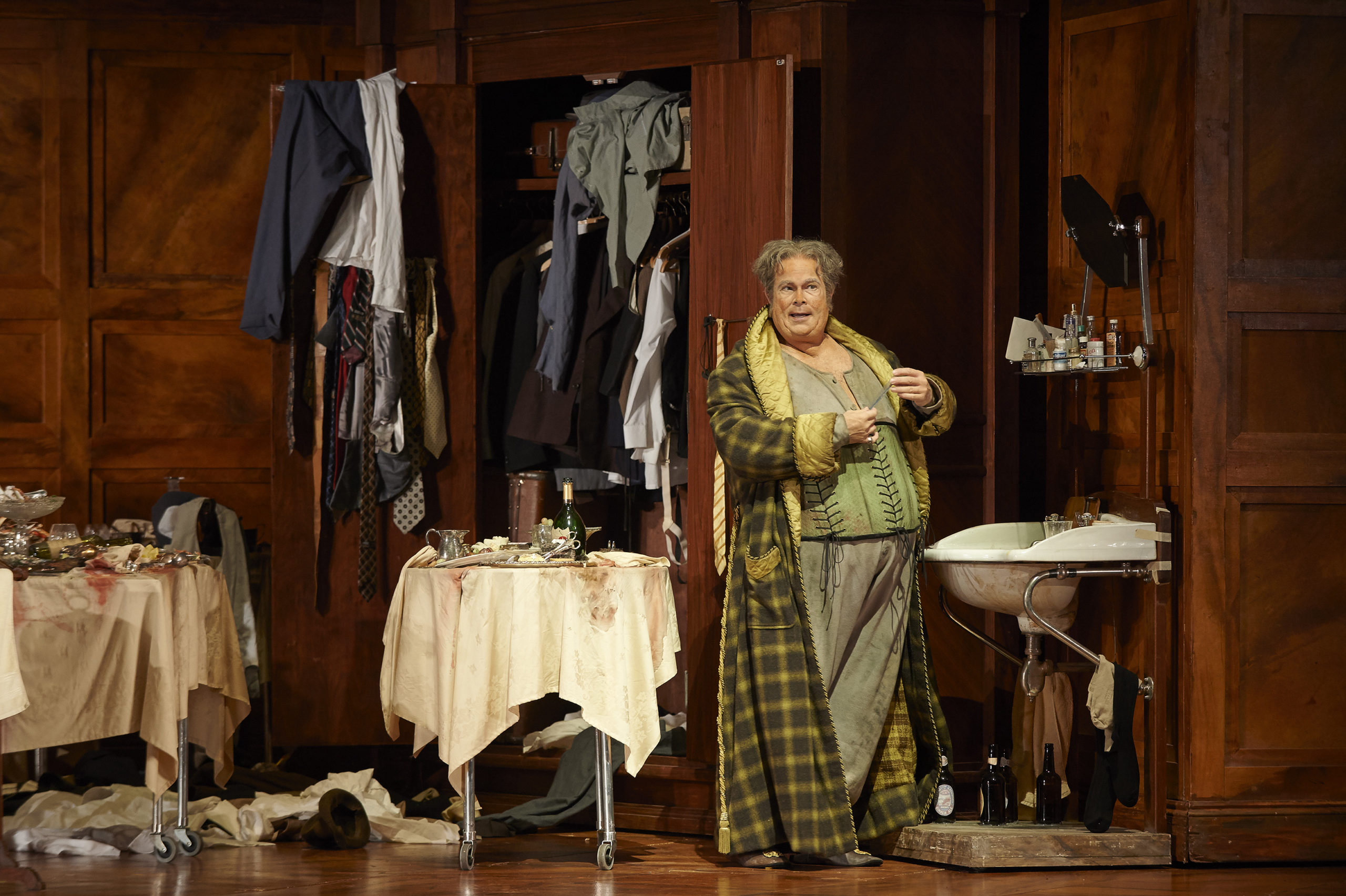
Gerald Finley as Sir John Falstaff in the Canadian Opera Company production of Falstaff, 2014. Photo: Michael Cooper
As a personal aside, I have distinct and fond memories of Finley’s performance as the lead in Rossini’s Guillaume Tell; I was fortunate to see him perform it live at the Metropolitan Opera in a production from their 2016-2017 season. Finley’s robust Tell was a perfect echo of the character’s aching struggles (inner and outer), a seamless combination of great musicality, finely-crafted vocality, and a very keen, highly watchable theatricality; his was a deeply visceral portrayal, one that underlined the very real historical stakes while revelling in Rossini’s deceptively simple score. Finley is set to reprise the role this May at Bayerische Staatsoper, but before then, he can be seen on the stage of The Met (as Don Alfonso in Mozart’s Così fan tutte), as well as in Montreal and at Carnegie and Wigmore halls, where he’ll be performing a range of beloved lieder.
Finley’s distinct gift for German art song is beautifully expressed on a recording for Hyperion Records he and pianist Julius Drake made of Schubert’s Schwanengesang and Brahms’s Vier ernste Gesänge, released in autumn 2019. The pair previously recorded Schubert’s famed Winterreise cycle (2014), songs by Samuel Barber (2007) and Maurice Ravel (2008), and did a live concert recording at Wigmore Hall (2008). Schwanengesang (or “swan song”) is a song cycle written by Franz Schubert written at the end of his life in 1828. I’ve written about Schubert’s love of the writings of Goethe, but in this particular cycle, Schubert used the poetry of three writers, Heinrich Heine, Ludwig Rellstab, and Johann Gabriel Seidl; his publisher, Tobias Haslinger, was the one who cannily named the song cycle thusly, following the composer’s premature death in November 1828. The works deal with themes of hope, love, longing, disillusion, and disenchantment, their sounds gracefully moving between sombre, sensual, and stark. Brahms wrote his Vier ernste Gesänge (“Four Serious Songs”) in 1896, using portions of text from the Lutheran Bible. Writer Richard Wigmore observes in the album’s liner notes that the songs were “(d)esigned to comfort the living, and indeed Brahms himself” – the composer’s longtime confidante (some might say more) Clara Schumann had suffered a stroke earlier that year, and he wrote them partly in full anticipation of her passing, though he was also feeling the first effects of the cancer that would take his life a year later. Wigmore characterizes the works as “profound, unsentimental testaments to (Brahms’s) sympathy for suffering, stoical humanity, his belief in the virtue of hard work, and the enduring power of love.”
Finley and Drake capture these themes with vivid clarity on the album. The opening track, “Liebesbotschaft” (or “message of love”), in which the speaker asks a little stream to send his message of love along to his beloved, sees Finley carefully modulating his chocolatey-bronze bass baritone, sensitively complementing, than contrasting, dense sonic textures amidst Julius Drake’s rippling, breath-like piano performance. On the famous “Ständchen” (“serenade”), a song in which the speakers asks his beloved to bring him happiness, Finley lovingly caresses every syllable so delicately so as to make the listener lean in, as if being told a very private secret. The meticulous attention paid to blending clarity and expression, particularly in the Brahms works, is miraculous; nothing sounds wooden and hard, but rather, silken, and fluid, with just the right amount of sensuality in phrasing and tone. Albums like this remind me why I love classical music, of its transcendent power to so often say what spoken language cannot. Finley’s deep dedication to the art of song is entrancing and he has a true and brilliant partner in the acclaimed Julius Drake. I had long wanted to discuss lieder with Finley, and the duo’s beautiful Schubert/Brahms album provided the perfect excuse to enjoy another lively conversation with a deeply dedicated and authentic artist.
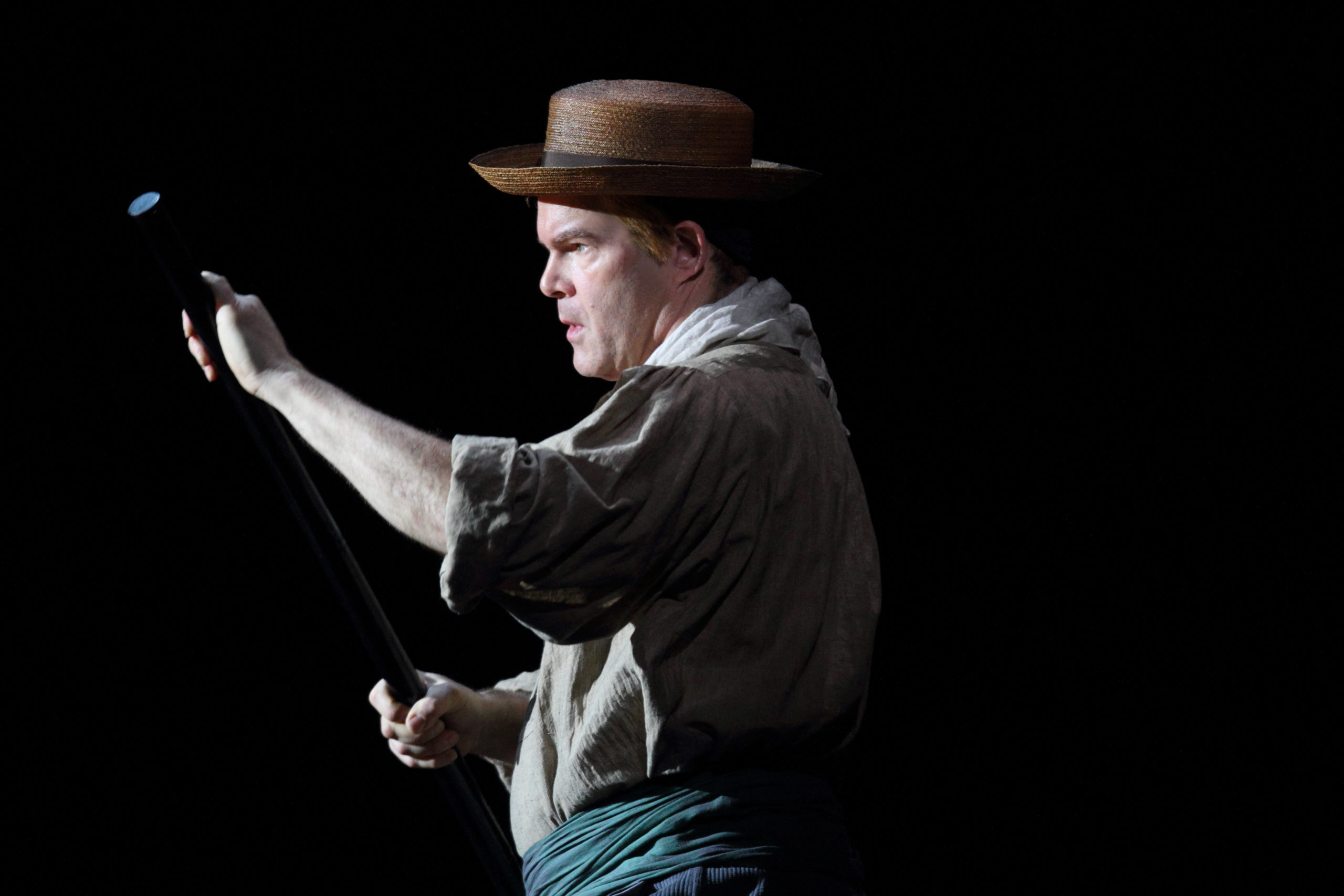
Gerald Finley as the Gondolier in the ROH production of Death In Venice, 2019. Photo: Catherine Ashmore
I read that you were afraid of Schubert for a long time – is that true?
Oh yeah!
Why?
Well, because he’s so simple. The thing about Schubert is that he is basically such a natural melodist and really gives the idea these songs have existed forever; I think to make them one’s own if you like, to have one’s own connection and one’s own version, and putting one’s own version into the world, takes a lot of confidence. The main thing about it is that I felt it would reveal all my technical insecurities and failings, and … I think it’s only really in the past decade really, that I’ve felt those sort of things have ironed themselves out. Put it this way; I always felt I could sing Schubert but I never felt competent enough to actually do it. I always shied away from the types of repertoire which would reveal my weaknesses rather than my strengths.
Now it seems as if, having had so much experience with the music of Schubert, his work has become a part of your artistic identity…
Very much, but it’s taken me a long time to become comfortable with the culture of the language, and of the poetry, and the culture of the German history therein. Many young singers direct their early careers into German houses because that’s where obviously lots of work is, and they have the privilege of learning German and being in a German environment for the early parts of their careers, and for various reasons I didn’t do that – I actually rejected a place at the Hamburg State Opera when I was 26, because I knew I wasn’t ready, I wasn’t vocally prepared for that. So I kind of negated my opportunity to become immersed in the German environment and that entire musical world and experience. So my German became something I would learn on the way doing concerts, doing tours with orchestras; until my mid-30s I actually never appeared in a German opera house. It took a long time for me to become comfortable with the language. It did happen, eventually – I was invited to festivals in Austria and did Papageno in and around Germany, so that helped a lot to bolster my German confidence.
And you know, there have been a lot of really good German lieder singers, and to be part of the lieder fraternity is really something I longed for. I learned Wolf and Brahms and I did my best at Schumann for a while, and enjoyed it all very much, but Schubert being kind of the father of those, I realized it was going to take some time to get to the core, but it did happen, where I felt could really go to that altar for the father of lieder, and say, “Here’s my humble offering of what you have written!”
And of course Fischer-Dieskau was the main thing, my first recording was his Volume 1 of Schubert – so yes, it confronted me very much: what business did I have even attempting it?! I kind of got over it and realized, and still feel, Schubert has been my friend, he’s somebody I look to for inspiration. He demands I really think carefully about what it is to be an artist, because (the music) is so relatively clear on the page, and one this almost blank emotional canvas to treat the verse differently and to infuse the words in a way which will give meaning. There’s a feeling as soon as you record it, that the version you have in your head and heart at that moment… well, you will suddenly think, “Oh! But I could’ve done it this way!” So that’s why keeping performances scheduled in the diary is really wonderful, those versions will change and develop. And hopefully, going to other artists and seeing how they handle (the same material) – it’s really inspiring to develop. I don’t know whether painters go through the same thing, where they redo canvases all the time or decide they want to add various elements or develop a theme – but there we are, that’s why lieder is such a fountain of artistic joy now, and I feel that vocally I’ve been able to sort of finally mature into it.
Performing these pieces one has to be willing to enter into a specific place, or places, as you know, and being human, one’s not always in the mood or one’s tired, or there are other things going on – it’s not easy, but there are similar challenges in doing opera performances. What changes for you, going between your recital work and your opera work? How do you navigate those changes?
It’s a mindset, really. First and foremost, lieder is an intimate art form – it’s really thoughts which are, you know, nurtured out of a poet, and you get the feeling there’s a very personal relationship between the composer and the poetry they’re setting, that the way they’ve been inspired and reacted, or want to bring certain elements of a poem to the fore, takes quiet contemplation, it’s a very mindful thing. My very good friend and colleague (tenor) Mark Padmore says the difficulty of doing lieder recitals is that it was really meant to be sung amongst just a few people, and again, it’s really a very intimate art form, almost a private thing. What you’re asking audiences to do is give up elements of their busy lives and come into a space where they can become very quiet and very thoughtful, and think, not about what’s on the surface of their lives, but to delve a lot deeper, and a share a poetical journey, a psychological situation with a recitalist, in a way that is pretty demanding.
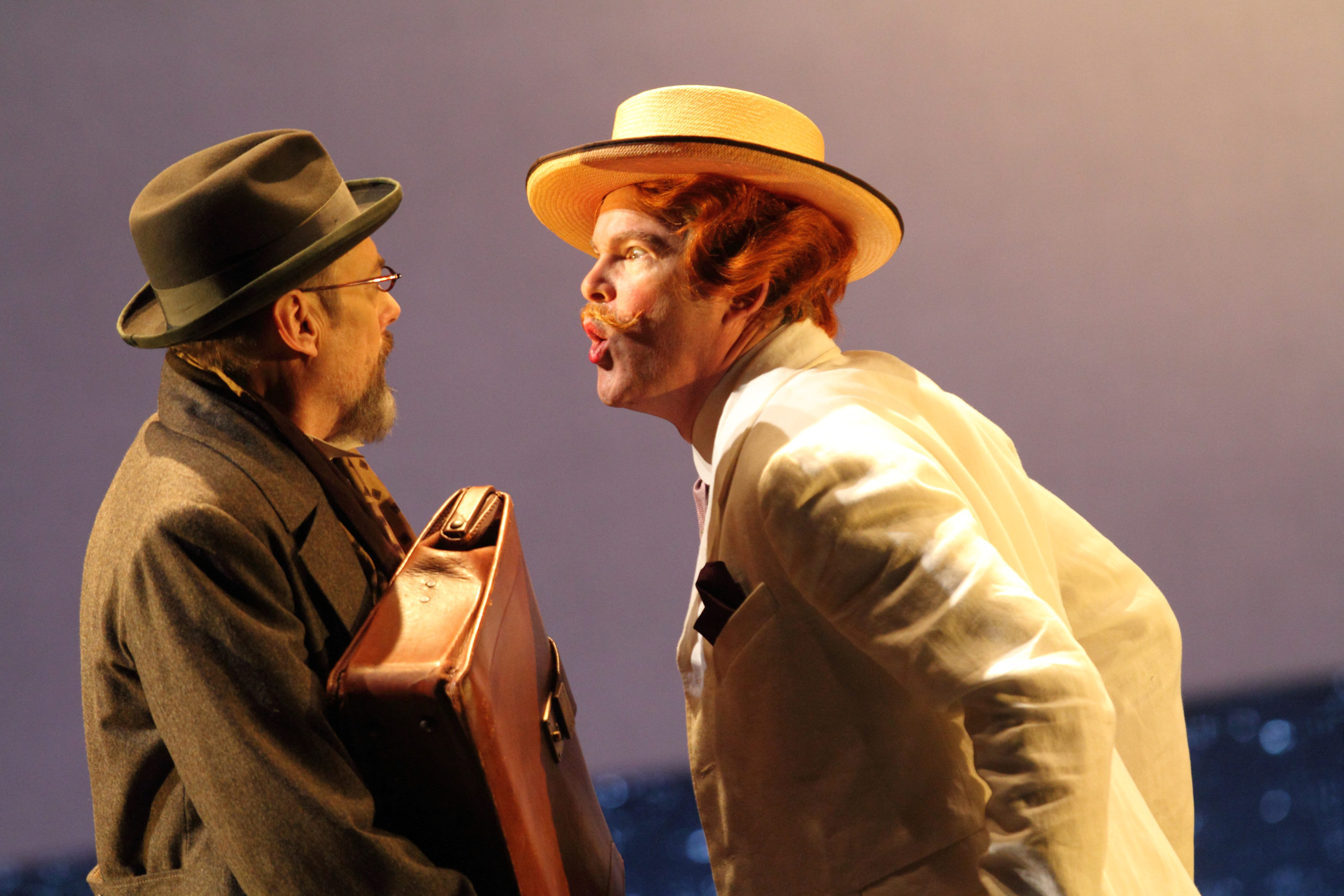
Mark Padmore as Aschenbach and Gerald Finley as the Elderly Fop in the ROH production of Death In Venice, 2019. Photo: Catherine Ashmore
We do put demands on audiences, and it could be the cause of decline in audiences for lieder because it takes special listening skills and patience, and a certain acceptance that, okay, particularly for non-linguists, there are a couple pieces they may feel estranged from, but at least they’re there, listening to beautiful piano playing and hopefully good singing. So we’ll keep doing it, to keep people give them that opportunity to get involved with the best parts of their soul.
There’s something healthy about having that demanded of you as a listener. I want that to be demanded of me when I go to concerts, because otherwise I don’t feel I have a very satisfying experience.
Indeed! And to your question about the differences between lieder and opera for the performer, really, opera is such a collaborative event, you, the singer, are at the top of the iceberg as it were, you appear above, on the top 10th, or more like 2%, of a wealth of creativity and musicality and theatrics and administration too, so your voice and portrayal is a culmination of a h-u-u-u-ge team effort.
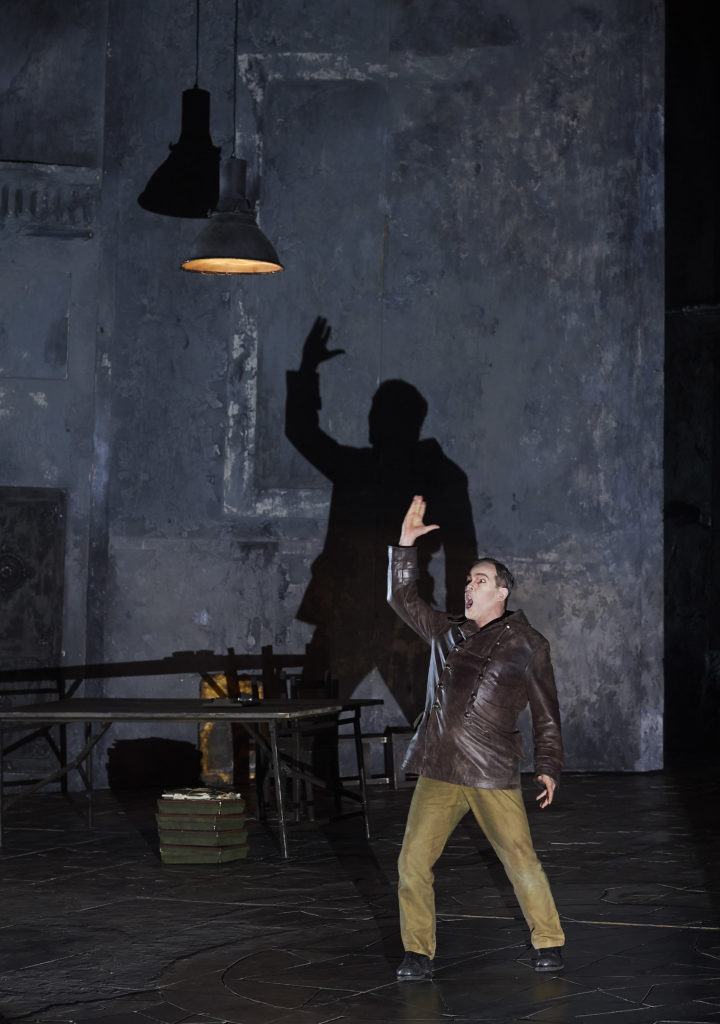
Gerald Finley as Iago in the Canadian Opera Company’s production of Otello, 2019. Photo: Michael Cooper
And yes, you have to deliver the goods and focus on your character, and give your vocal performance the absolute top level in extremes, and that’s really not what lieder is about… it’s not much teamwork, other than with your fellow musician, and it can be chamber of course, as part of a string quartet or with a guitarist or flutist as well as the piano version, so I like to think that perhaps you are your own stage manager and production team and artistic personnel (in lieder recitals).
There are people who are endeavoring to bring out the essence of the presentation of lieder in a more theatrical way, like having staged elements, and I find that a revelation – because why shouldn’t people be inspired by beautiful, fundamental music? I tell you what: pace Barbara Streisand, if a pop singer got hold of a Schubert song and did something amazing with it, you’d be finding people saying, “Well, that’s a cover version, but where’s the original?” Hopefully! Or the other way around, take a Joni Mitchell song and rewrite it as a Schubert lied or Brahms lied, and… yes, I think we just need to be a little more accepting of how people are trying to just make sure these elements of inspiration can be shared by all.
Speaking of shared inspiration, the baldly emotional nature of lieder translates into the demands it makes on singers: you can’t hide.
That is actually one of the challenges of the technical aspects. Often the frustration about being a younger singer is that one hasn’t quite got the technical lability to be as free and honest in vocal terms. There are lots of wonderful musicians who are doing beautiful things with their voices but it means less, and that’s what we’re after, of course, is “the beautiful voice.” For me, my heroes are Fischer-Dieskau and Tom Krause and Hermann Prey, or José Van Dam doing Mahler; you’re not worried about how they sound, you’re worried about how they feel, but the reason you do that is because their voices are in such perfect shape! It’s like suddenly their instrument is serving them – that’s why it’s a rare thing, because we singers spend our whole life trying to figure out how to sing in order to be free, to be free from all that.
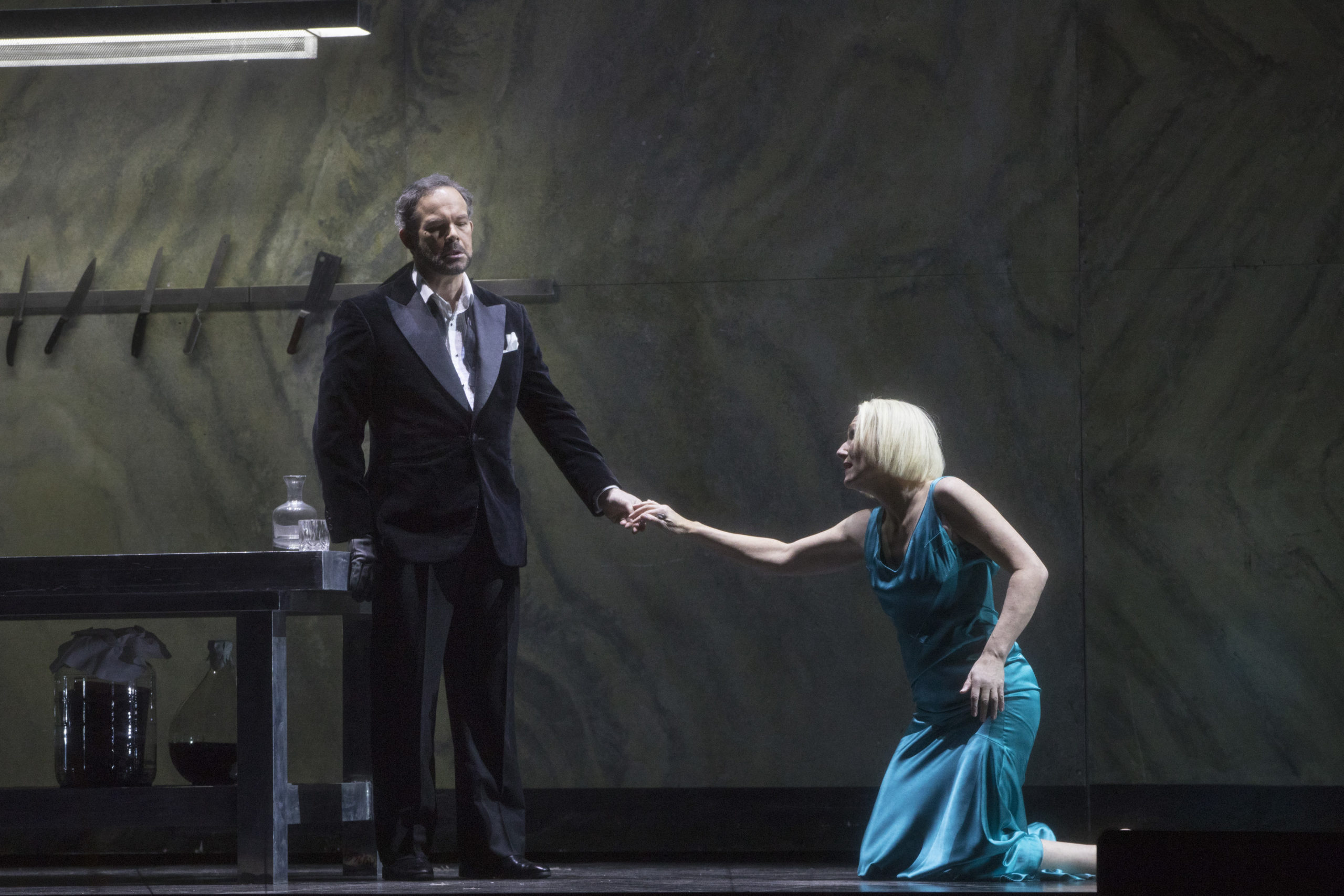
Gerald Finley as Bluebeard and Angela Denoke as Judith in Bartók’s “Bluebeard’s Castle.” Photo : Marty Sohl / Met Opera
It’s a fascinating pairing on this album. What was the thinking behind including the music of Brahms? The linguistic and musical poetry is so different from that of Schubert.
Essentially, I mean, in a kind of a very facile sort of conceit, the Brahms works were among the last things he wrote. He was at a time when he was in deep mourning for Clara (Schumann), and … well, to hear that Brahms… he was always at his best when he was thinking about hard things, big challenges, and the richness of the writing is so extraordinary. So in terms of periods of life for both composers, you know, really they are the two respective “swan songs,” effectively. I always feel Brahms is somebody who thought he knew where the spiritual elements of his life lay; you get it in the Requiem, of course, and certainly in these songs, and in the late string music. It’s all very dense and full of passion, and we feel that. I mean, Schubert knew he was dying of course, Brahms a little less, even though it was late in his life; he knew his time as a composer was reaching its end. So you get this kind of creative surge from both composers, and that’s really what attracted us to doing these works.
From Brahms’s overall output came many beautiful songs, but these ones are one huge level higher – the use of the language, the biblical texts, was very much something which encapsulated his fervor for the human potential of love and forgiveness, and relating to toil. As a socialist approach, it was, “death will comfort those who have toiled,” but also, “those who’ve lived comfortable lives is why there’s fear but there is still hope that the comfort of death will be here for you” – and that’s remarkable as a thesis. So yes, in these Brahms songs, death is treated with great… hope, and love, I’d say. The idea of being in a marvelous revelry of celebrating life – “What was it? Life was love; the greatest of all these things is love” – so I do feel Brahms was an extremely passionate person, behind all that grizzle.
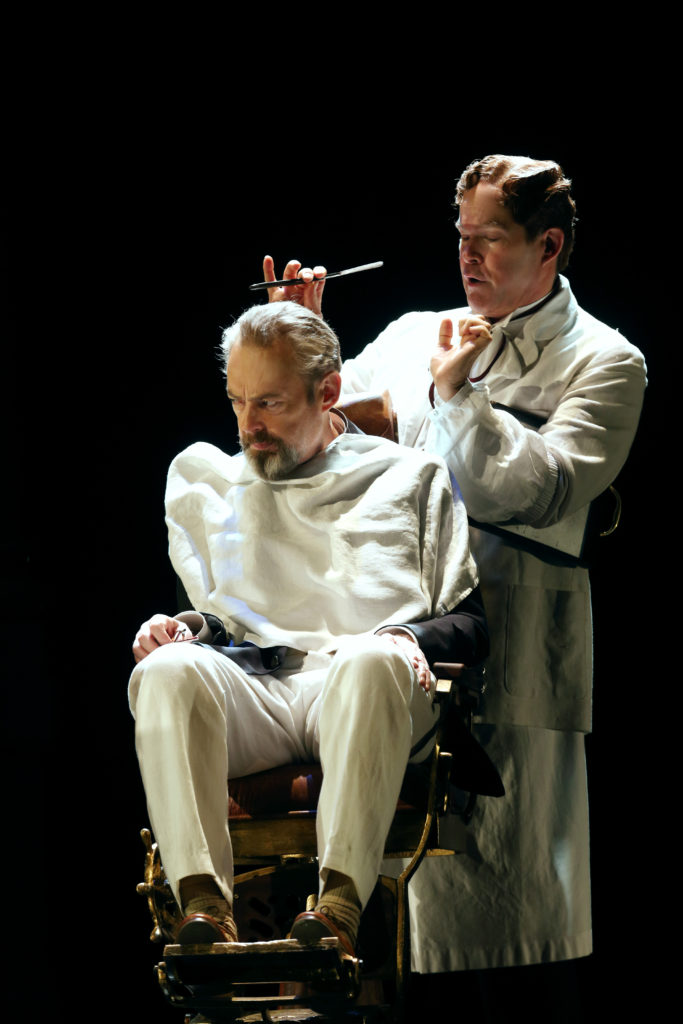
Gerald Finley as the Hotel Barber and Mark padmore as ASchenbach in the ROH production of Death In Venice, 2019. Photo: Catherine Ashmore
That sense is especially noticeable in the final song, “Wenn ich mit Menschen” (When I am with people), which draws together spiritual longing and human logning, the epic and the intimate, in this great expression of acceptance and understanding.
Completely! The elemental earnestness of it – “Ernste” – I almost feel if you didn’t get it in the Requiem, then yes, you will here. One’s life can have a sense of accomplishment if you have loved – and he loved through this music, and certainly in life…
Clara.
Yes, Clara for sure, and his mother as well, which was a big element. We know much less about Schubert’s love life and I suppose that makes him slightly more mysterious as to what his thoughts on love were, except for the fact that if you delve into the songs, for instance the Serenade, really, it’s a marvel of positive thoughts in a minor key, and negative thoughts in major keys, it’s just extraordinary how he goes against convention in thinking minor is more fulfilling than major keys. There’s lots of wonderful mysteries, shall we say, about Schubert’s music in that regard. He did struggle with the idea of being recognized too, as a composer of any worth, and from that point of view it’s also, you wonder, was he ever appreciated? Did he ever feel his music had any worth? And for me that’s the melancholy aspect of not just him but many people — Beethoven not hearing the applause, for instance – but the whole idea is that these composers are wearing their passions in their music, and thank goodness for it.

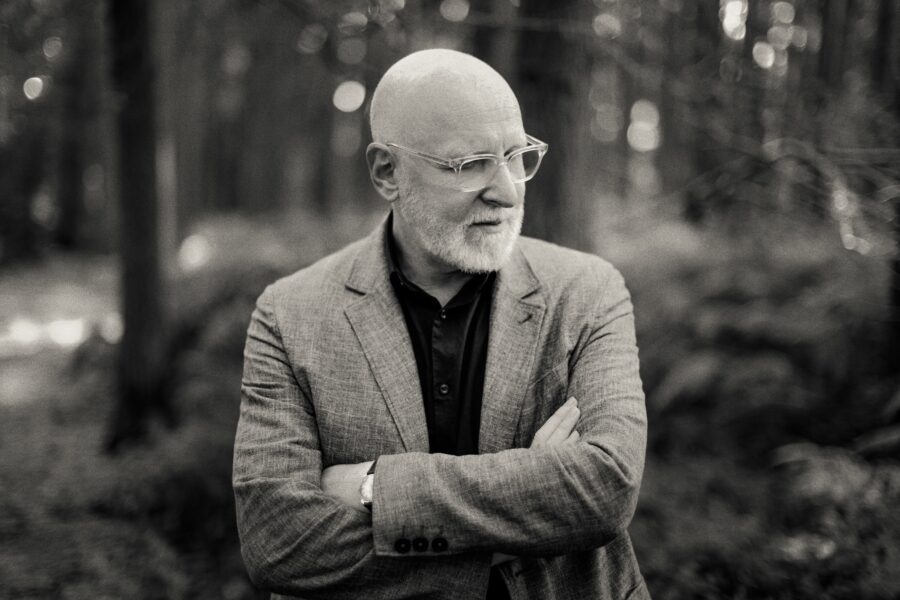
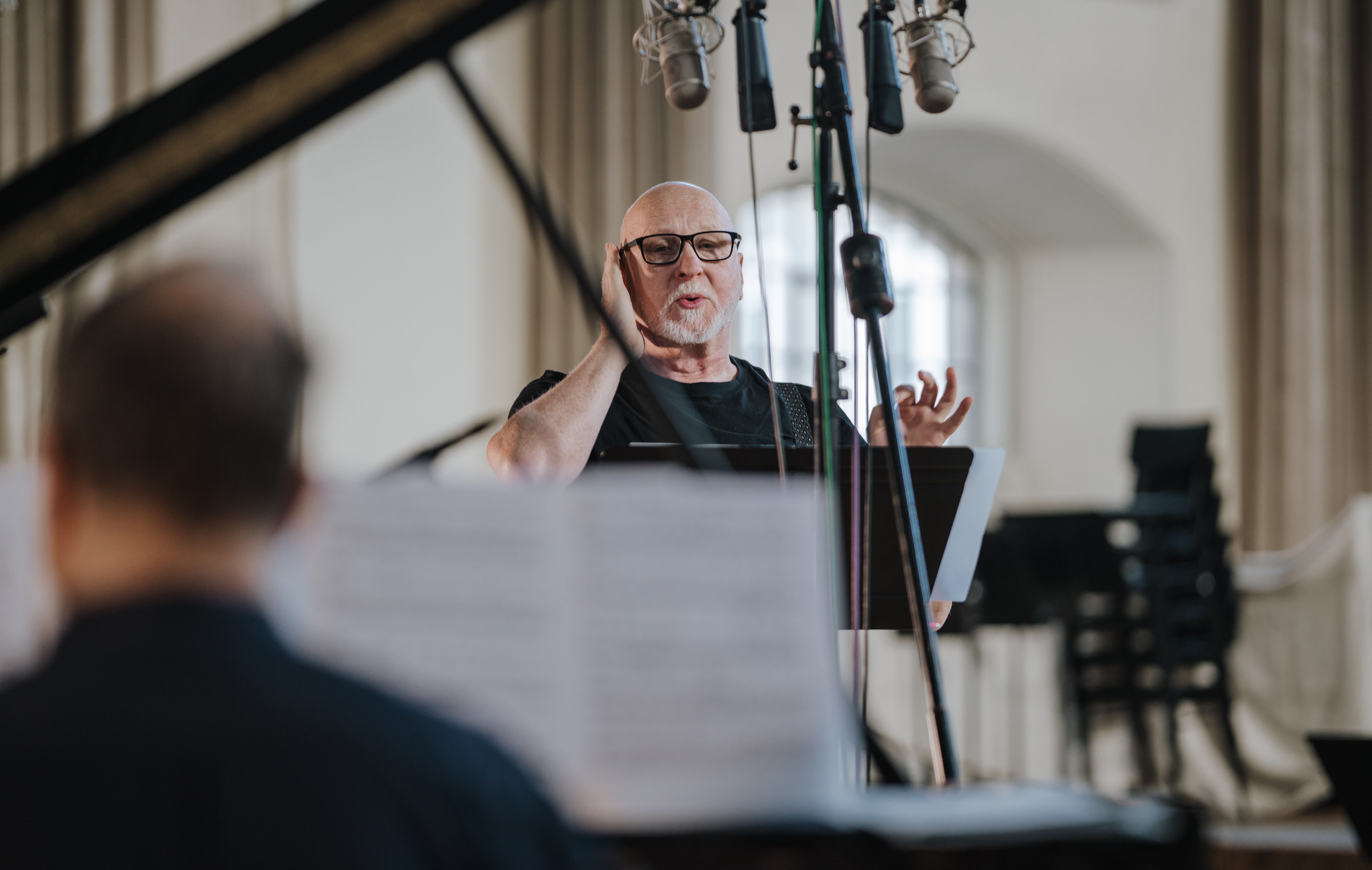
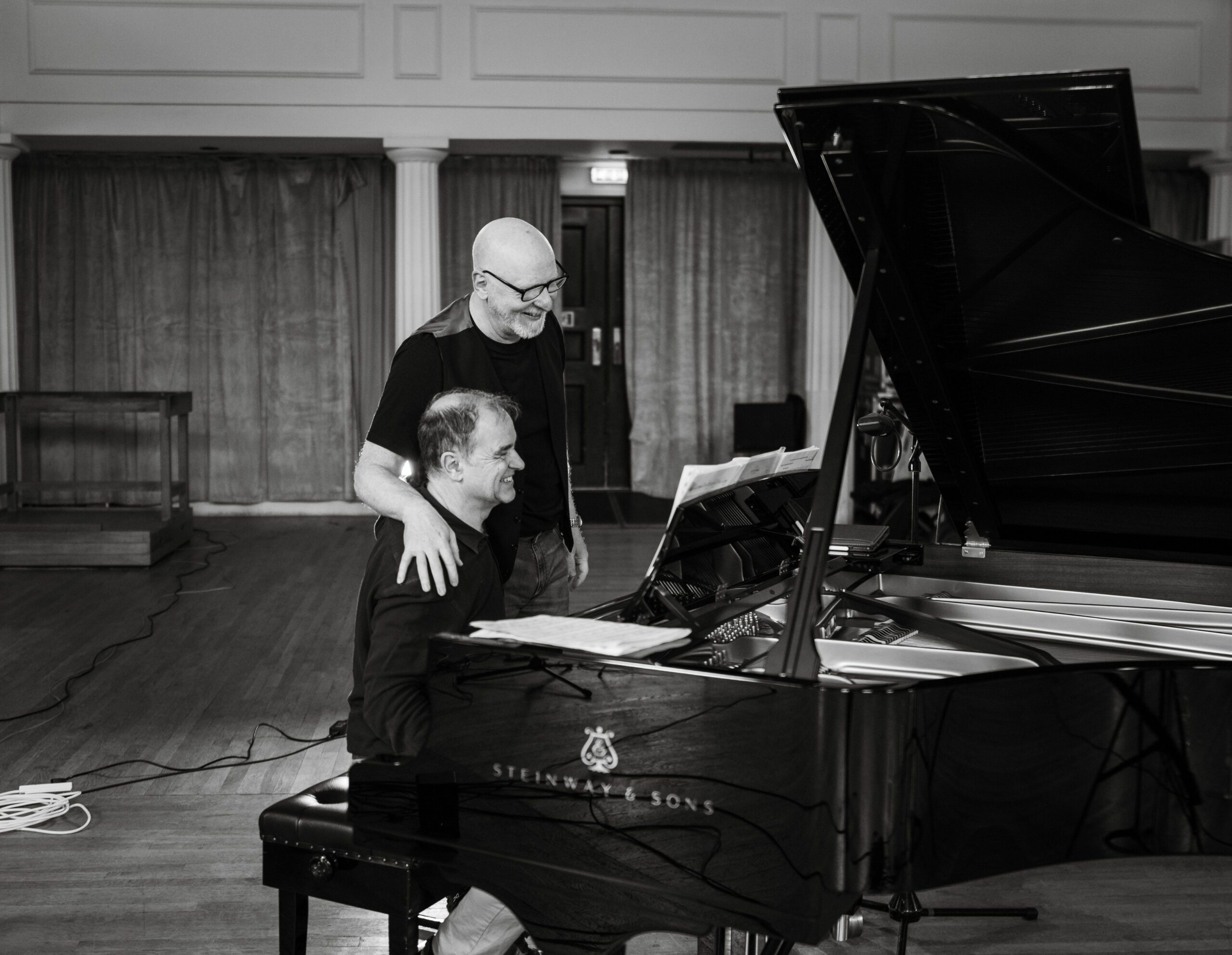
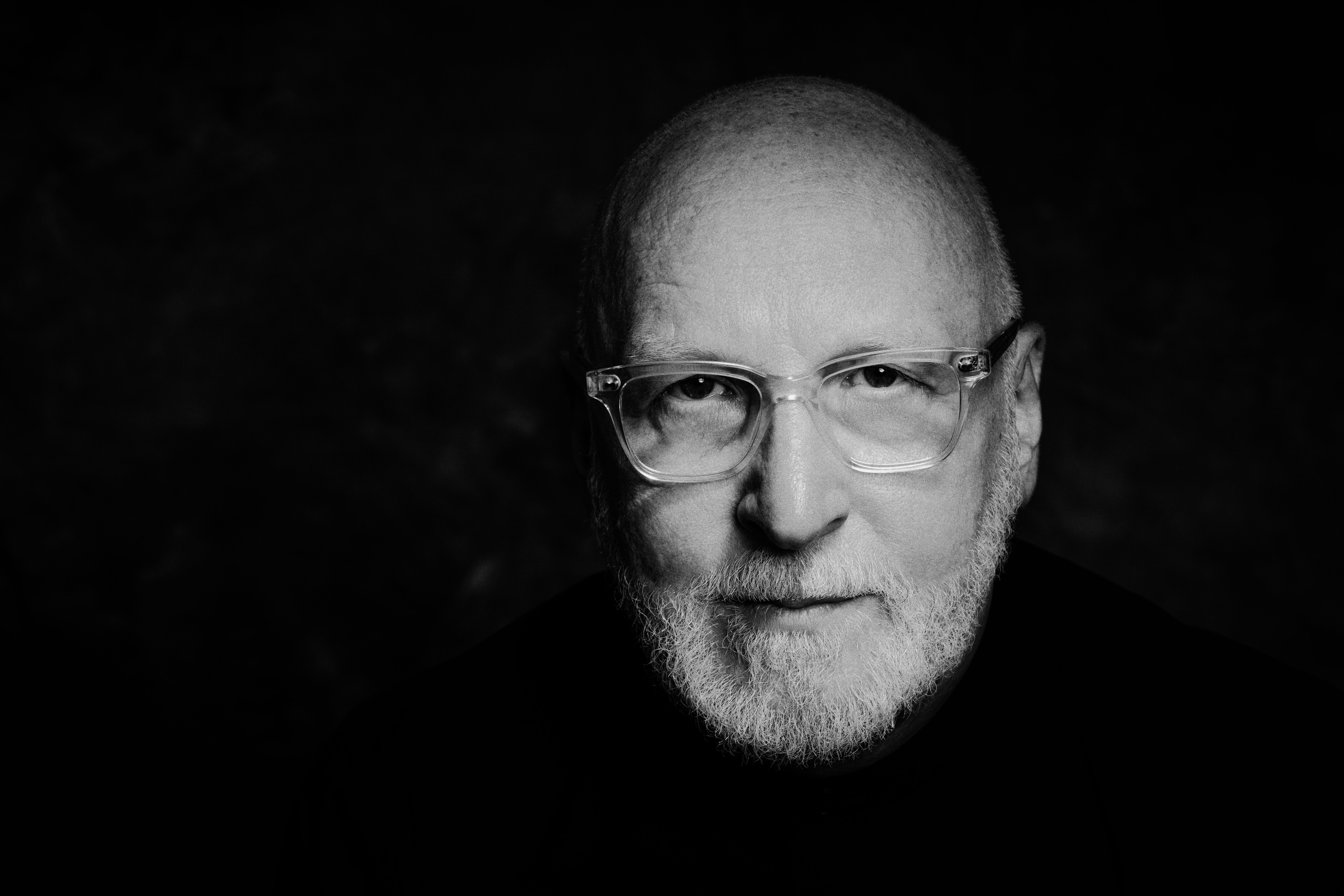
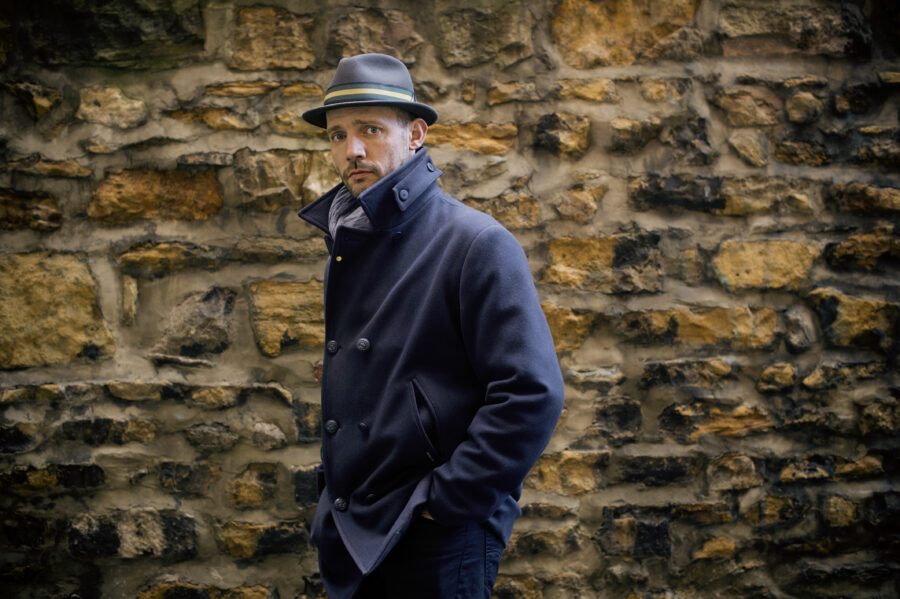
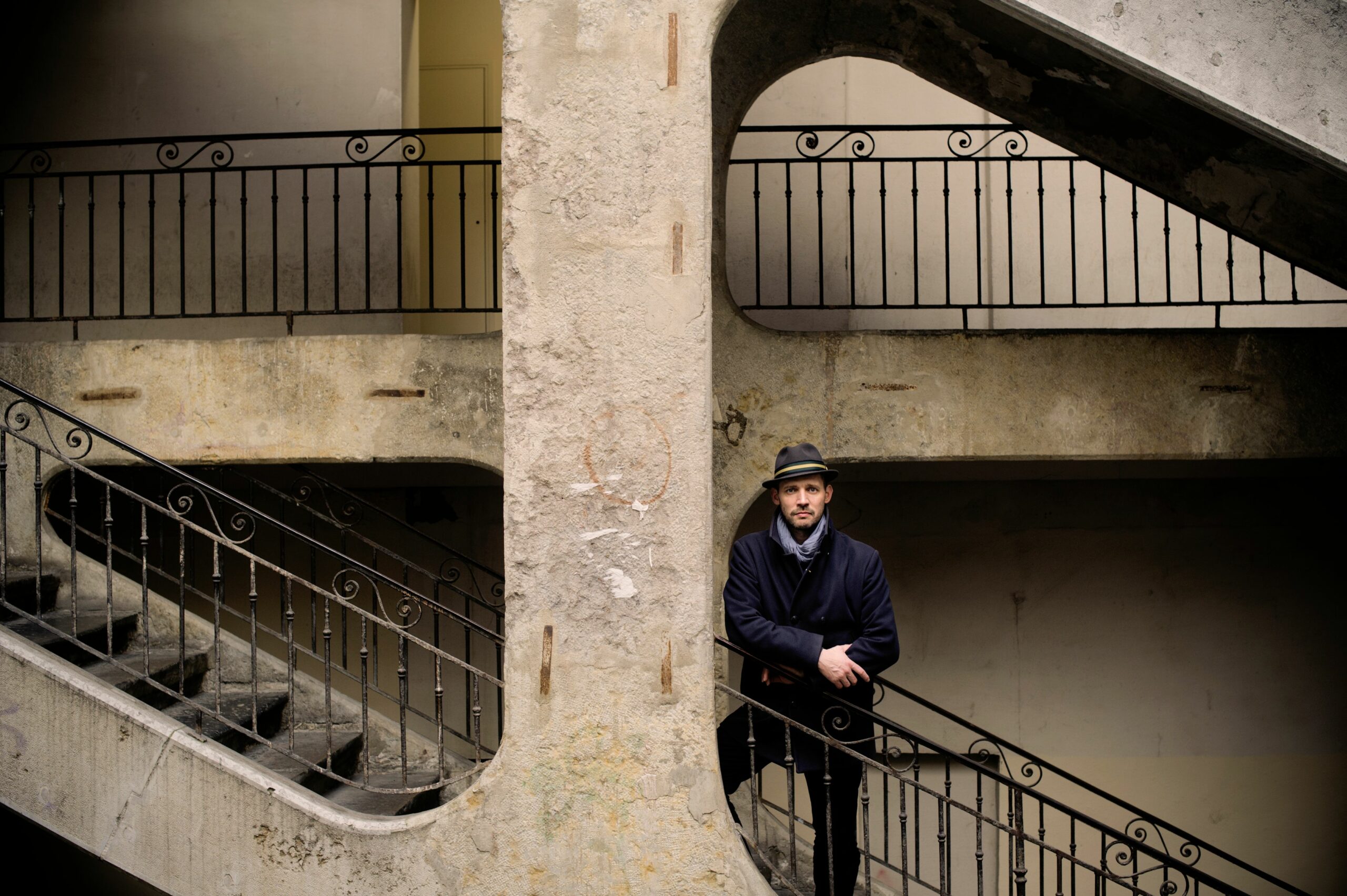
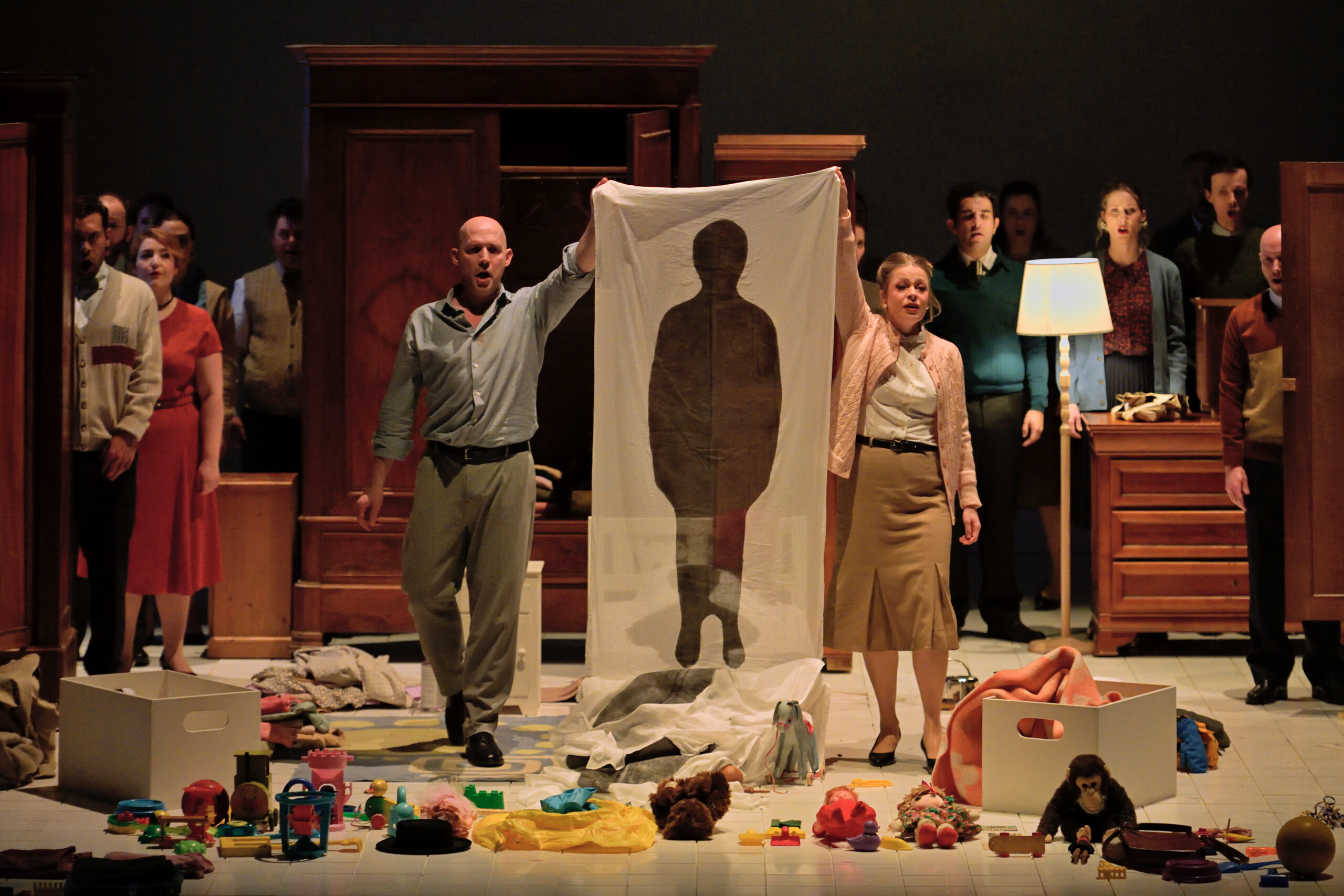
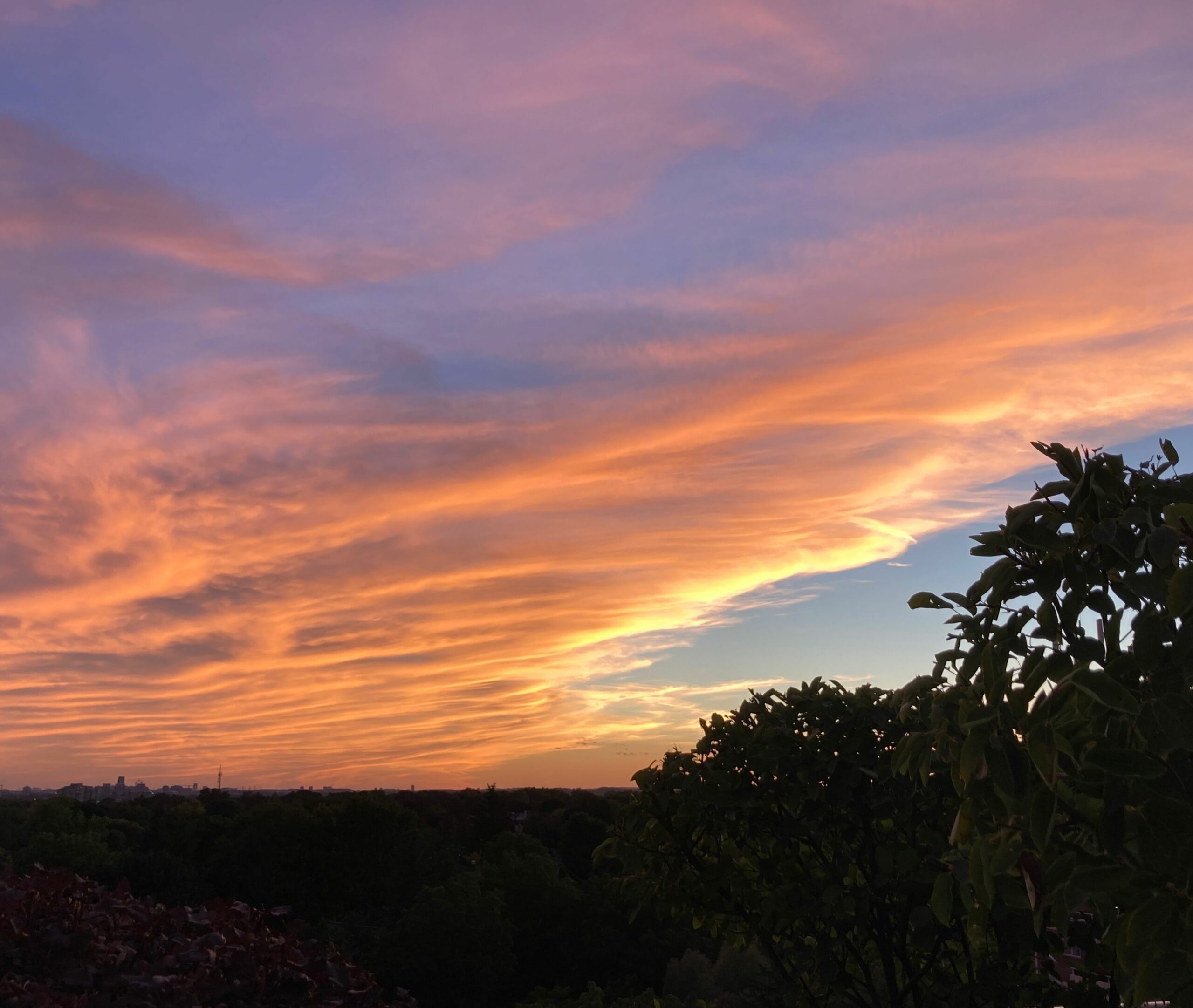
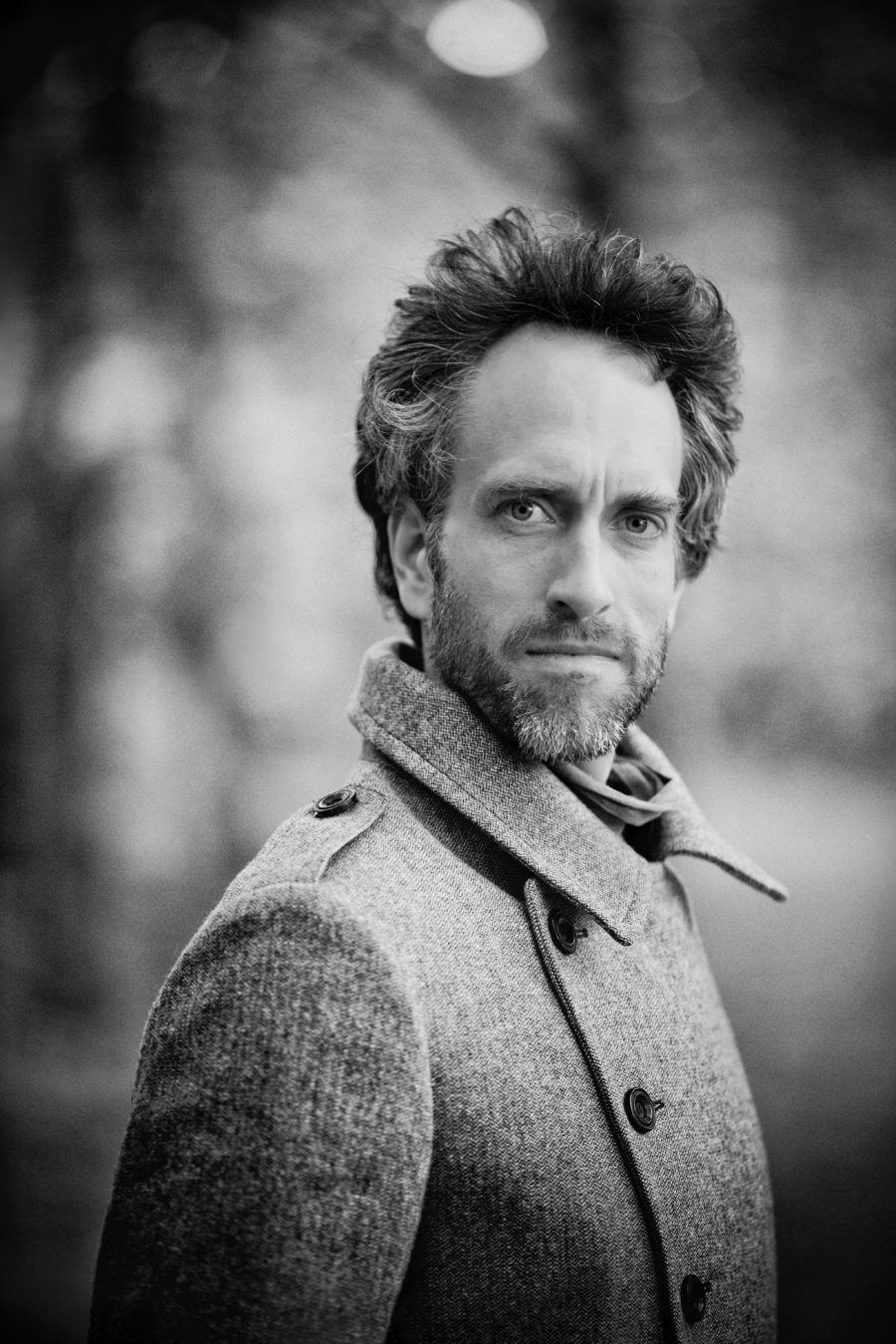
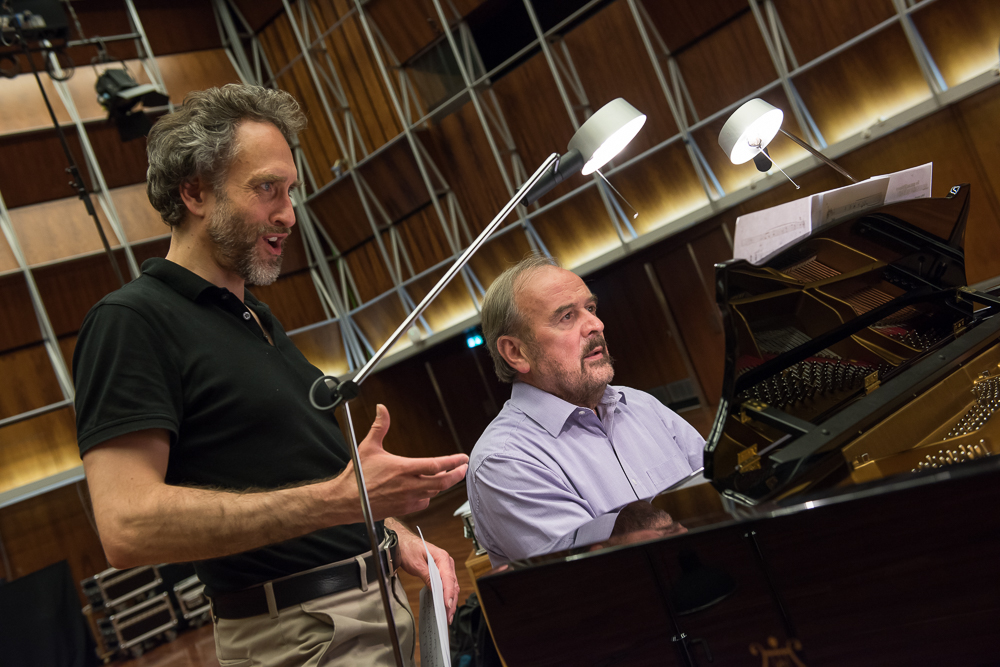
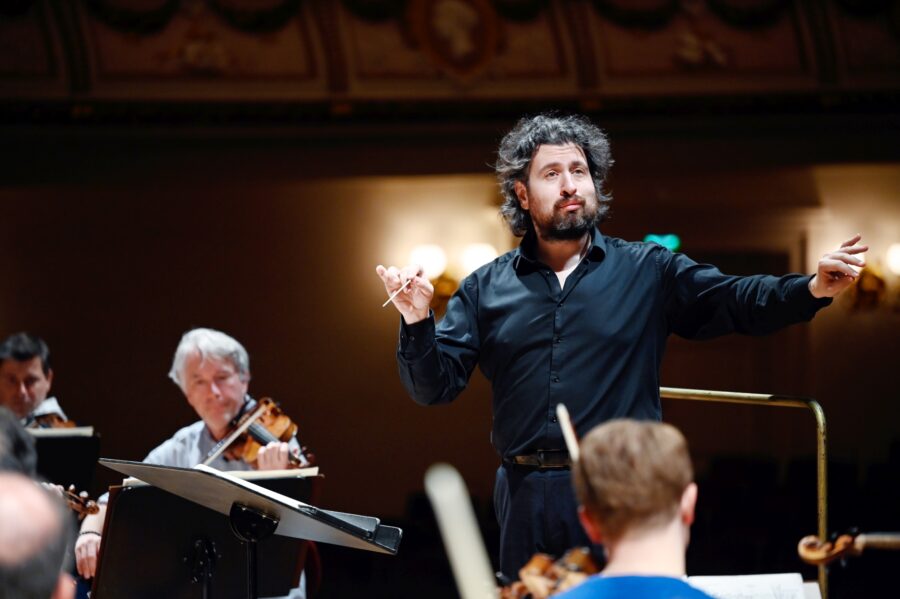
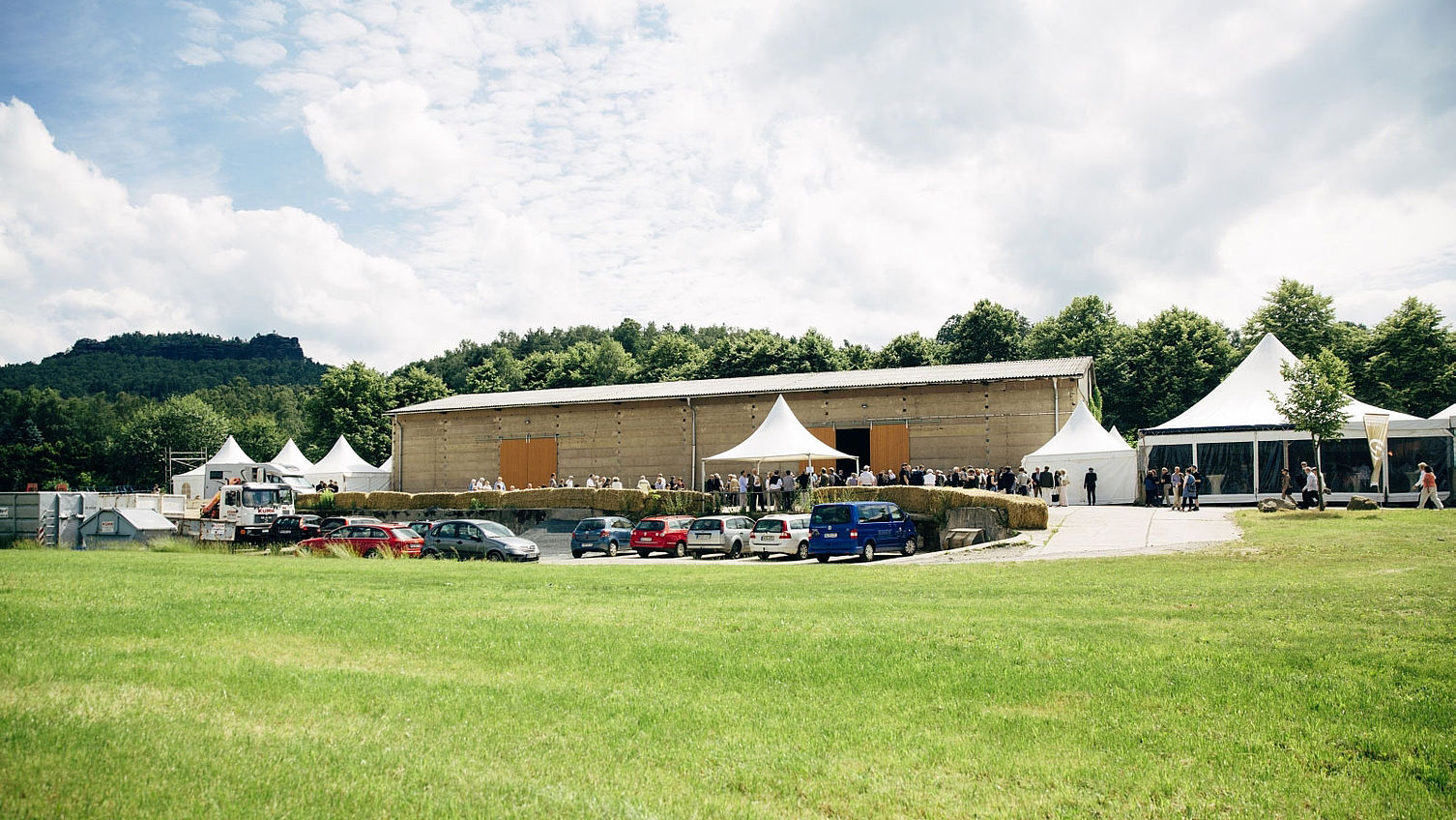
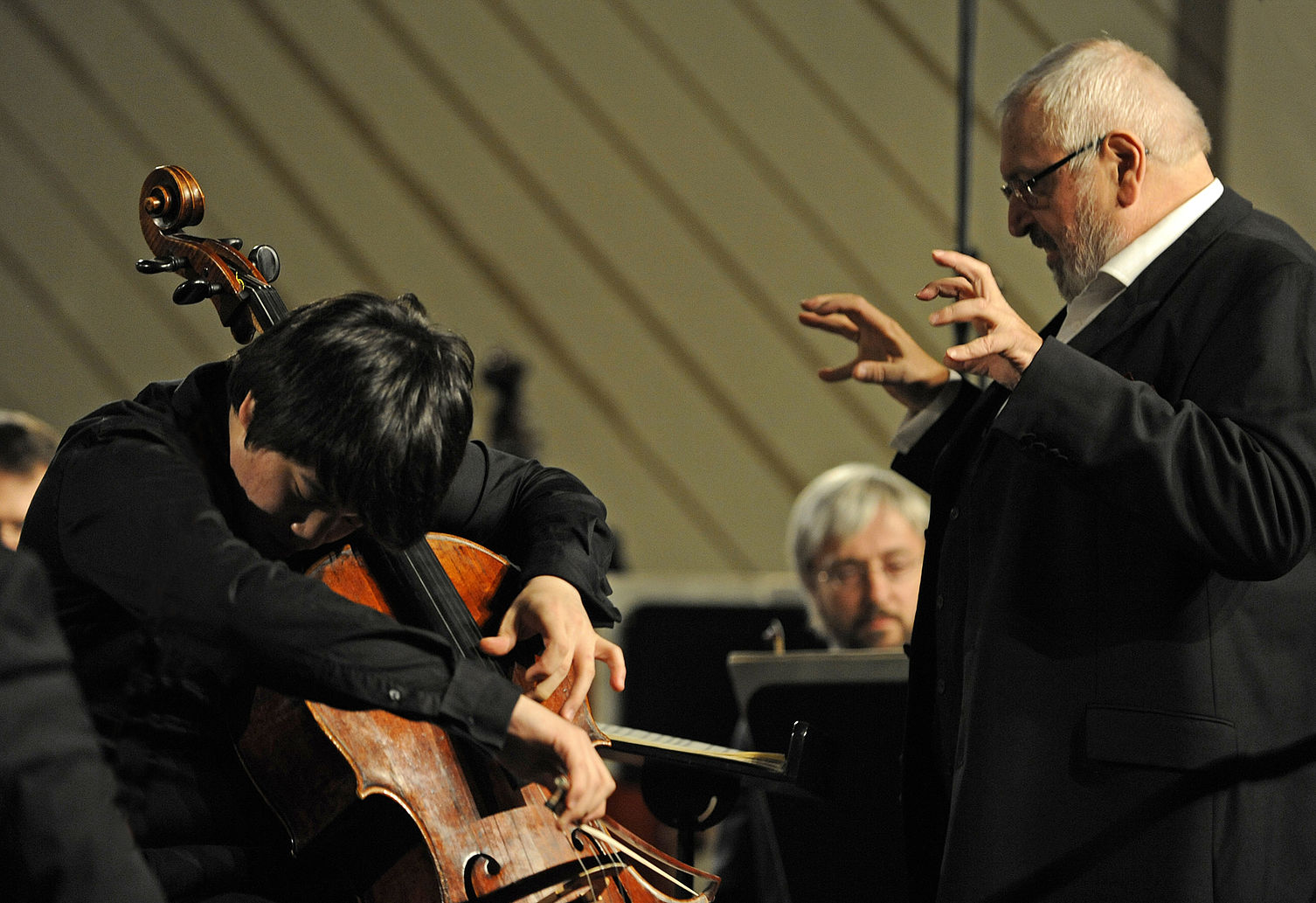
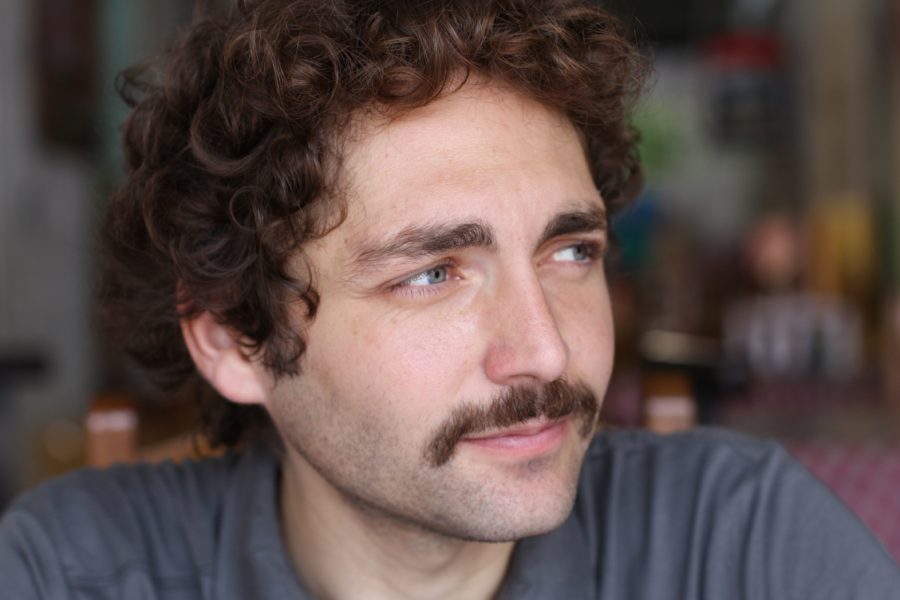
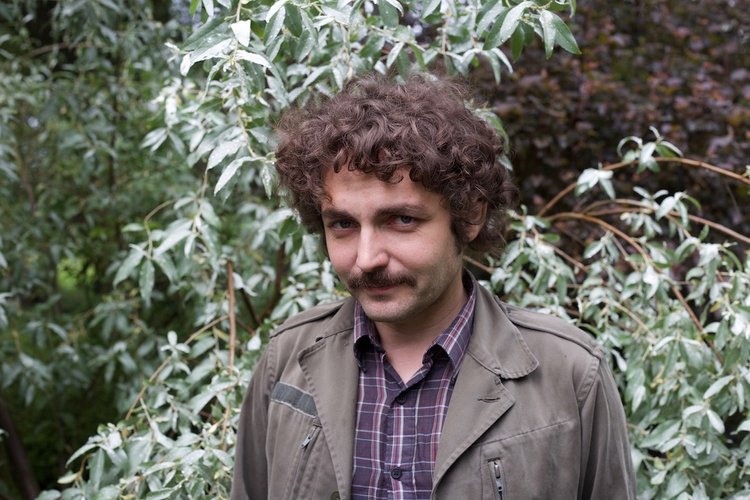 You’ve translated authors whose works are now more widely known, and you’ve taken part in panels on Ukraine; do you think the attention on the country and its authors will lead to an overall greater curiosity and knowledge?
You’ve translated authors whose works are now more widely known, and you’ve taken part in panels on Ukraine; do you think the attention on the country and its authors will lead to an overall greater curiosity and knowledge?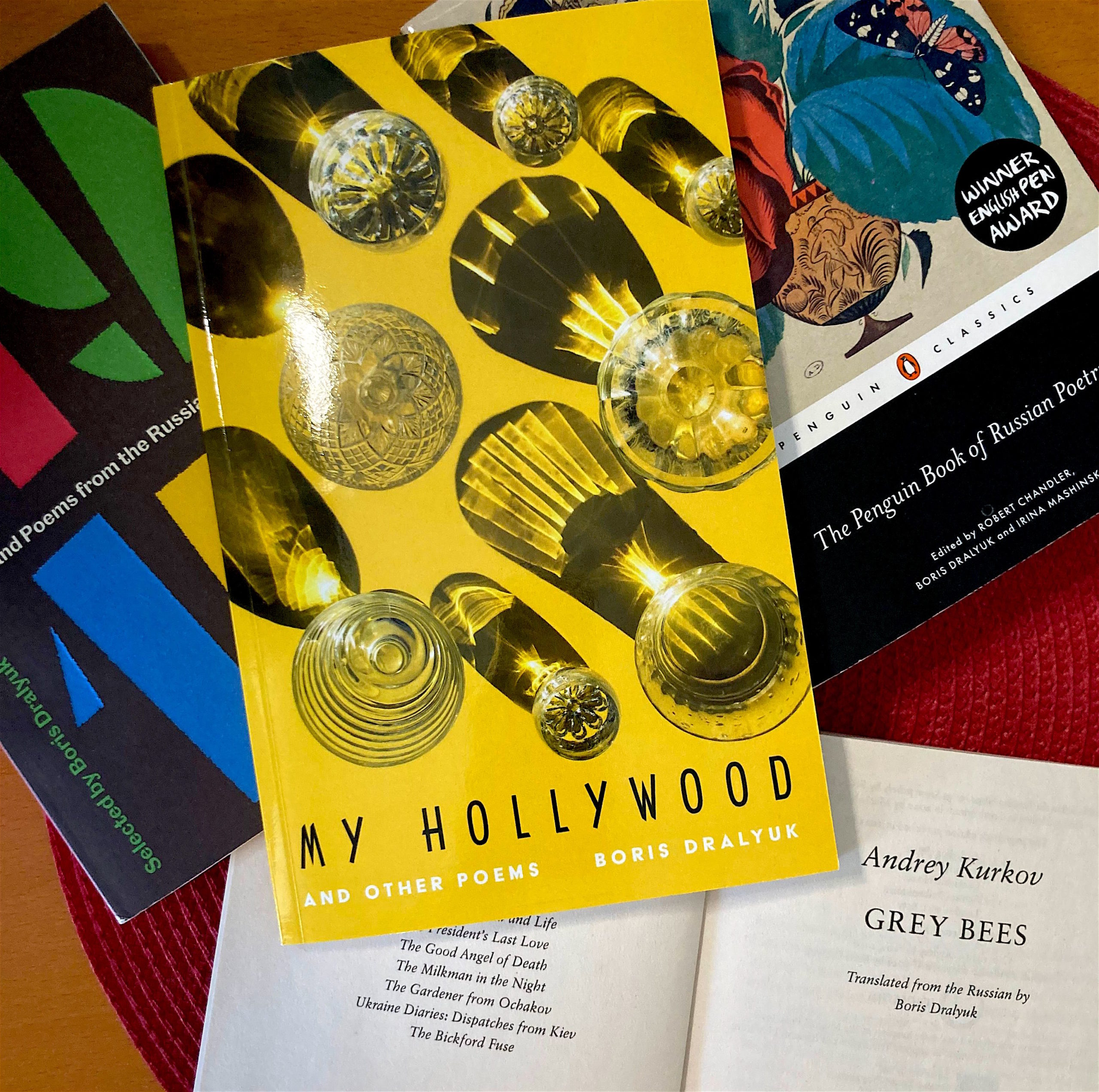
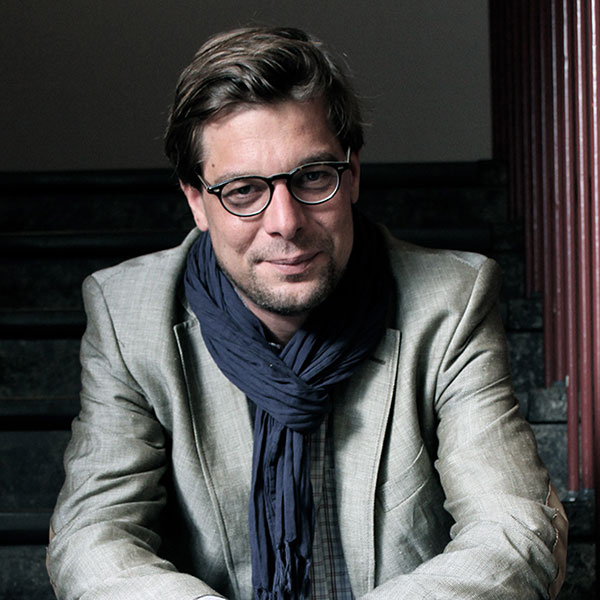
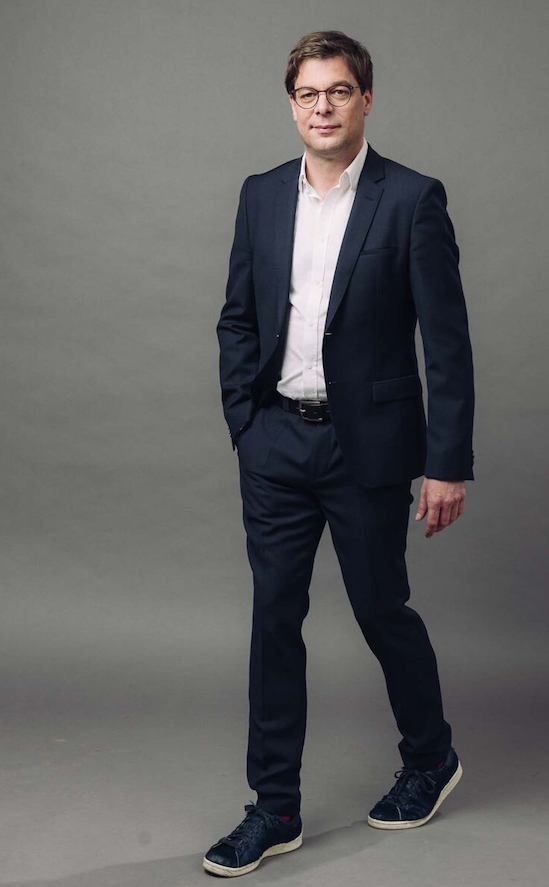 Reading your article I was struck as to why arts journalism isn’t conducting these kinds of investigations during a war in which so many cultural figures – and organizations, and programming – are affected.
Reading your article I was struck as to why arts journalism isn’t conducting these kinds of investigations during a war in which so many cultural figures – and organizations, and programming – are affected. 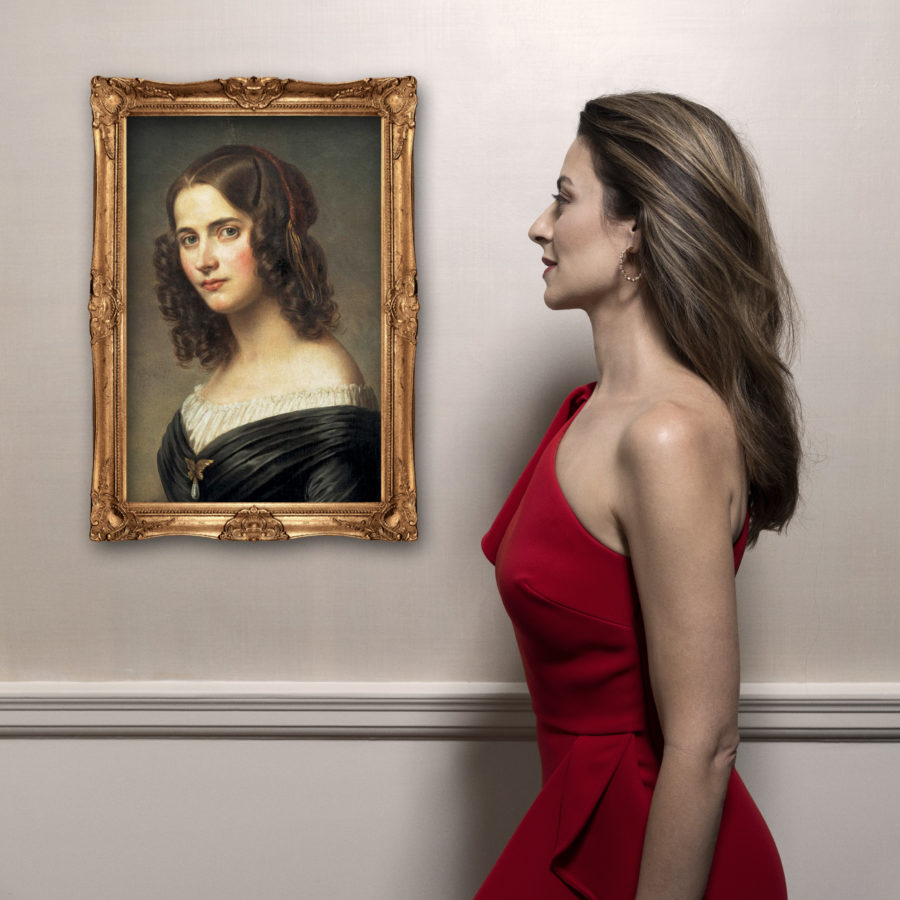
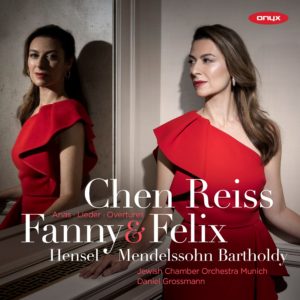 Acknowledging the various roles Hensel fulfilled in life allows one to more fully engage in her art, and to contemplate the whys, wherefores, and hows inherent to her creative process. Thus might one build an understanding, of not only her body of works, but the uniquely creative elements at play within them. Elements of the past (Bach, Beethoven, Schubert), contemporaneous (Schumann, Liszt), and future (Brahms, Liszt) intermingle in some thoughtful ways, and one senses, especially in her later works, a through-compositional style that would’ve found fulsome expression on the opera stage, a medium for which she would have been eminently suited. Soprano Chen Reiss agrees on this point, and brings her own beguiling brand of elegant, operatic flair to a new album. Fanny Hensel & Felix Mendelssohn: Arias, Lieder & Overtures (
Acknowledging the various roles Hensel fulfilled in life allows one to more fully engage in her art, and to contemplate the whys, wherefores, and hows inherent to her creative process. Thus might one build an understanding, of not only her body of works, but the uniquely creative elements at play within them. Elements of the past (Bach, Beethoven, Schubert), contemporaneous (Schumann, Liszt), and future (Brahms, Liszt) intermingle in some thoughtful ways, and one senses, especially in her later works, a through-compositional style that would’ve found fulsome expression on the opera stage, a medium for which she would have been eminently suited. Soprano Chen Reiss agrees on this point, and brings her own beguiling brand of elegant, operatic flair to a new album. Fanny Hensel & Felix Mendelssohn: Arias, Lieder & Overtures (

